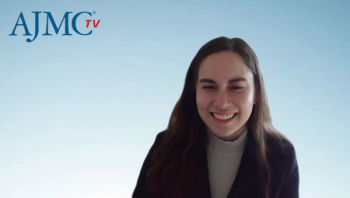
Advocate Discusses Her Family's History With Hidradenitis Suppurativa
The journey to a diagnosis of hidradenitis suppurativa was different for her compared with the path faced by her children, said Brindley Brooks, who founded HS Connect (HSconnect.org), a patient advocacy group for those affected with the disease.
Brindley Brooks, who founded HS Connect (HSconnect.org), a patient advocacy group for those affected with hidradenitis suppurativa (HS), discusses how her journey to a diagnosis was different than the one faced by her children.
AJMC®: Can you describe your initial journey with hidradenitis suppurativa (HS), and was it difficult to get a diagnosis?
I have had HS for over 30 years now. My HS started when I was about 10 or 11, and I was not diagnosed until I was 16, formally, so I follow kind of the same 7-year delay to diagnosis that most people have experienced with HS. I was seeing a general care practitioner originally, and they were "lancing"—quote unquote—my boils when I was a child and did not really know what HS was. They were just considering them individual boils at that point. I finally did see dermatologists as I got to the age of 16 and was formally diagnosed at that point with HS.
AJMC®: You have children with HS—was their path to diagnosis different than yours?
I have 2 children with HS. One is my biological daughter who is 15. The other is my stepdaughter, who is now 19. It was interesting when my stepdaughter started presenting with signs of HS that we know that it's not an infectious disease and we know that it can't be spread from person to person, but as soon as someone is in your family like that and also has this—what we're told is a rare condition but isn't, just rarely talked about—it was kind of shocking. I did look at where she was having her lesions, the way that they behaved. It was definitely very, very typical of HS, but, obviously, I wanted to make sure that that was diagnosed by a medical provider. I was nearly 100% certain, but I wanted to make sure that that was diagnosed by a medical provider.
We did take her to a dermatologist, and she was diagnosed with HS. As soon as she started kind of talking about her diagnosis with her family, on her mom’s side, she did learn that her biological grandpa had dealt with HS his entire life, they just never talked about it. Then the linear pattern became clear that it was a genetic predisposition on her end, which made me hugely relieved. It was nice to know that we could figure out where that came from and that that was the reason that she had it. The timing—she couldn’t have come into a better family, honestly, than to come into ours with everything we know about HS. We live and breathe HS in our house.
My biological daughter started when she was about 11—10 or 11—as well. I knew about the genetic predisposition to HS. I did not focus her entire childhood on it, because I really wanted to let her just enjoy being a child. There’s no way to tell whether they actually will or will not end up with HS. As soon as she started exhibiting signs, I was very, very saddened by that. But again, couldn’t have come into a better family for that. We know how to deal with it; there’s a lot of empathy around it. So, yes, it’s been an interesting journey.
Typically, when I go to appointments—I do attend appointments with both of them—I don't talk about what I do or my role in HSConnect, because I just want to be a patient parent at that point, a caregiver. But usually, it comes out because there's some bad information that's being given or inaccurate information, or at one appointment my younger daughter was told that she needed to start on Humira without even having been physically examined. Those kinds of things I'm highly sensitive to. It's definitely something that has shaped their journey with HS having me as a mom, for sure.
Newsletter
Stay ahead of policy, cost, and value—subscribe to AJMC for expert insights at the intersection of clinical care and health economics.







